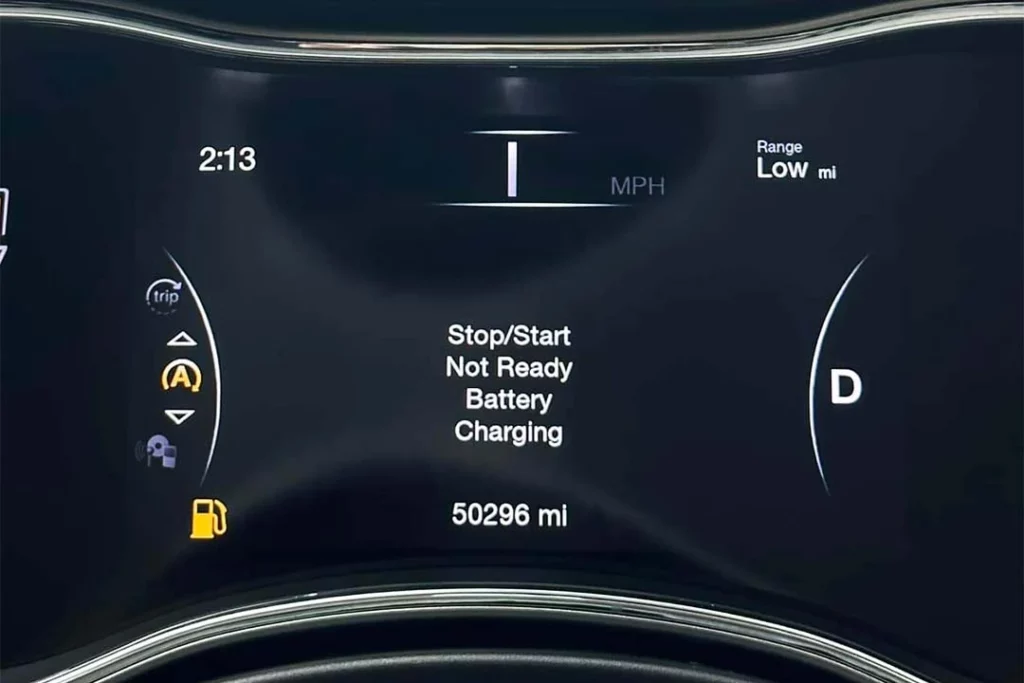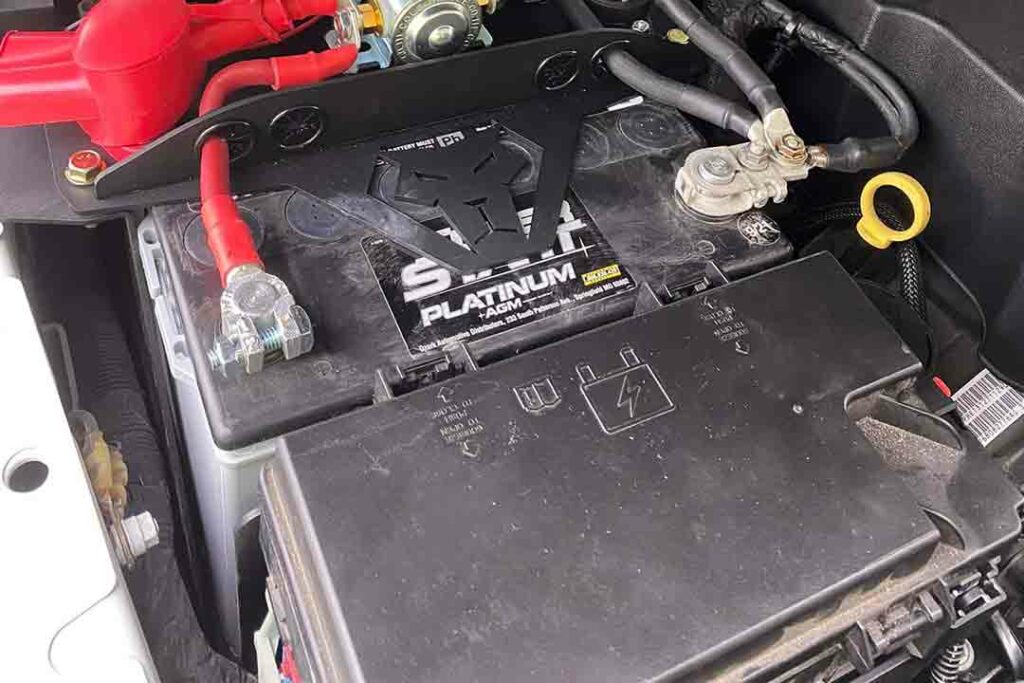Stop/Start Not Ready Battery Charging: 10 Possible Causes And Fixes
These days, cars come with cool features to save gas and help the environment. One of these features is the Stop/Start system. But, a common hiccup many drivers face is seeing a message that says Stop Start Not Ready Battery Charging.
If you have a 2019 or 2020 Jeep Wrangler or Gladiator, you are bound to face this issue one day.
The OEM primary and auxiliary batteries in your Jeep are not up to the mark, and for some reason or another, they become weak or dead. Hence, you see the warning message.
There can be other reasons, too, such as a faulty IBS sensor and your driving patterns, or it can be as simple as the batteries not being charged enough.

In this article, I’ll explain the error, figure out why it happens, and offer insights into troubleshooting. But first, let’s find out what the meaning of the Stop/Start Not Ready Battery Charging warning is.
Table of Contents
What Does the “Stop/Start Not Ready Battery Charging” Mean?
The Stop/Start system saves fuel and benefits the environment. Sometimes, out of nowhere, your Jeep flashes a message Stop Start Not Ready Battery Charging. What’s the meaning of this?
This message is your car’s way of telling you that it can’t keep the battery charged when the engine is off, or that the battery needs charging.
The reason could be that a car part, the battery, or the whole system is having issues. Most of the time, when you see the error saying Stop/Start Not Ready Battery Charging, there’s a problem with the battery.
Don’t be alarmed if you see this error on your Jeep; it is merely a warning that your battery is not charged sufficiently.
The ESS system (Energy Storage System) just needs to charge. It works to store the battery energy and uses that power to run other electrical systems in the car.
When battery levels become low, the Stop/Start system gets temporarily disabled so that it can charge. At that point, the error message appears on the screen.
When your Jeep is showing you this error, you should check if the condition of your car is just what the ESS system needs.
- You have at least 12 volts and a 70% charge for both batteries.
- The weather is not too hot (below 140 degrees) and not too cool (above -8 degrees).
Dealing with ESS issues is like joining a universal Jeep club. Everyone goes through it at some point. Especially if you drive a 2020 Jeep Wrangler or Jeep Gladiator.
A Stop/Start Not Ready Battery Charging Jeep error may be caused by various issues. But the battery most likely needs to be replaced, or there’s something wrong with the charging system.
Let’s learn how you can troubleshoot your Stop/Start system.
Why Does Your Jeep Say Stop/Start Not Ready Battery Charging?
The Stop/Start Not Ready Battery Charging error tells you that your batteries need some time to charge. It doesn’t have enough charge to enable the ESS system.
If you drive for more than 30 minutes, the ESS system or the AUX battery should be adequately charged. The Stop/Start system should work from then on.
However, if the Stop/Start system still doesn’t work, then there is an inherent issue that prevents the ESS system from charging or properly working.
At this point, you’ll keep getting the Stop Start Not Ready Battery Charging error whenever you start your Jeep.
This message is usually related to the charging system or the battery. Let’s discuss these issues at length.
1. Faulty AUX or Main Battery
Usually, the Stop/Start Not Ready Battery Charging warning points to a bad battery. Surprisingly, most of the time, it’s the main battery.
Your Jeep is really smart, but sometimes even smart cars have issues. The good news is that it can typically indicate where the issue is.
If you see Stop/Start Not Ready Battery Charging on your Jeep’s screen, it’s like a signal that says you’ve got a battery problem.
The battery powers your Jeep’s electrical system. If it gives up, your Jeep stops working—no engine, no lights, nothing.
Usually, batteries work well for 3 to 5 years, but tough conditions like extreme heat or freezing cold can make them retire early.
If your battery is struggling, none of the electronic stuff in your Jeep will cooperate, and that’s when the error message shows up.
Your Jeep has an AUX (auxiliary) battery. Its job is to power up the engine when the ESS system works.
This AUX (auxiliary) battery can be a troublemaker. If it faces extreme heat or electrical issues, it may not work.
When your Jeep has a battery that’s not working right, and it can’t give enough power to start the engine, that’s when the warning message keeps popping up.
If the AUX battery is causing trouble, replace it. However, get help if you are unsure how to proceed.
Making a mistake may not just affect the AUX battery; it could cause problems for the whole Jeep.
As a Jeep owner, you need to know that if the AUX battery is acting up, it can also bring down the main battery, creating a double battery problem.
Sometimes, auto shops change different parts before realizing the real issue was the batteries—both main and AUX.
If you want to test your batteries, always go to your dealership. They have the right tools and knowledge to properly test your batteries.
The real issue is that the auto Stop/Start system needs specific conditions to work. Your batteries may be okay, but not good enough for the auto Stop/Start system to work. Then you’ve got to replace those batteries.
Often, the primary battery cannot be fully charged because of defective cells. When this capacity drops below 70%, you’ll get an error message.
The batteries that come with Jeeps aren’t great. You need to get better batteries if you want to get rid of the problem for a long time. If your Jeep keeps showing the Stop Start Not Ready Battery Charging message, it may be time to think about changing the battery.

2. Malfunctioning/Re-Learning IBS Sensor
Another reason why your Jeep shows the Stop/Start Not Ready Battery Charging message may be the malfunctioning IBS (Intelligent Battery Sensor) Sensor.
When facing this issue, sometimes you take your Jeep to the dealer, and they check everything.
At first, they may say both batteries are good and charged. But the message may return the following day.
Back to the dealer you go to, and this time, they can’t find any problems but still change the IBS Sensor on advice from the tech gurus at Chrysler STAR.
Now, after putting in the new IBS Sensor, both batteries show low readings. The dealer may blame it on the sensor reporting a low charge, even though the batteries are supposedly fully charged.
A malfunctioning sensor will not give the correct reading. Hence, the computer can get confused and may show an error message.
You need two good batteries and an IBS Sensor that has gone through the right learning process.
The IBS learning process takes about a cycle of starting and stopping the engine multiple times with breaks in between. You may need around 2 to 5 restarts, with breaks lasting 4 to 8 hours.
Both batteries must be in good condition and fully charged at the beginning of the “re-learning” process for the IBS to function properly.
If not, the IBS may not learn what a full charge is, causing trouble for your auxiliary battery by always reporting the wrong information and leaving your auxiliary battery not fully charged.
If the problem is indeed a faulty IBS Sensor causing your Jeep to show the Stop Start Not Ready Battery Charging sign, the solution is that you need to make sure both batteries are charged up and a working IBS module is following the right re-learning cycles.
3. Corroded/Loose Cables
Corroded/Loose cables are another potential culprit for the Stop/Start Not Ready Battery Charging warning. Specifically, those connected to the auxiliary battery.
Even if your battery itself is in good condition, corroded or damaged cables can impede the flow of voltage during charging.
This inhibition prolongs the charging time for your auxiliary battery, triggering the persistent warning message.
Corrosion caused by battery fumes is a common factor in cable damage.
Replacing the faulty cable with a new one is a simple process—unplug the damaged cable, insert the new one, and ensure a secure connection.
4. Malfunctioning Alternator
Suspect a malfunctioning alternator if you see the Stop/Start Not Ready Battery Charging warning.
Your alternator supplies voltage to your auxiliary battery. It converts the combustion energy into electric voltage. However, the alternator is susceptible to faults.
Overheating, often caused by extensive use in hot weather, and short circuits that damage the diodes can render the alternator defective.
When the alternator fails, it jeopardizes its ability to supply sufficient voltage to charge the auxiliary battery.
In severe cases, the alternator may cease to function altogether. Then, there may be low voltage for the auxiliary battery, and the warning message Stop/Start not ready battery charging may appear.
To resolve this issue, you need to address any damaged parts within the alternator, ensuring its proper functionality.
5. Problematic Battery or Alternator Terminals
Another factor that can impact the charging system and lead to the Stop/Start Not Ready Battery Charging warning is a problem with the battery or alternator terminals.
The terminals may impede the flow of voltage through the system, if they are affected by rust due to battery fumes or exposure to moisture.
This hindrance results in a prolonged charging time for the ESS. It consistently triggers the warning message Stop/Start not ready battery charging.
The visible rust on the terminals makes diagnosis relatively straightforward. You only need to simply scrub off the rust using a screwdriver.
However, if the issue persists or proves challenging to fix, install new terminals for a comprehensive and lasting resolution.
Beyond the battery, cables, and alternator, you need to consider the condition of the terminals connecting the battery.
Their cleanliness and functionality are integral to preventing a low battery charge level and the associated error message.
6. Your Daily Commute Is Only a Short Distance
If your Jeep consistently displays the message Stop/Start Not Ready Battery Charging, the reason may be linked to your driving patterns, particularly the duration of your trips.
While you may use your Jeep daily, the key question is the duration of your drives.
If your trips are brief, around 10-15 minutes, it may not provide ample time for the ESS (Energy Storage System) battery to achieve a full charge.
Your frequent short trips can pose challenges for the ESS/AUX battery. It’s like you want your phone charge to reach 100% in 5 minutes, which is not a realistic outcome.
In some conditions, the situation may be worse. For example, cold weather conditions can exacerbate the problem. Freezing temperatures coupled with short drives can intensify the challenge.
Also, consider your battery’s condition. Even if your battery appears sound during tests, prolonged usage over a couple of years may result in subtle signs of wear.
Standard load testers may offer a positive evaluation, but the actual condition may be more serious. Your short drives won’t help the situation.
If your Jeep consistently signals the Stop Start Not Ready Battery Charging alert, alter the routine of brief trips. Introduce occasional drives of 30 minutes or more to significantly contribute to fully charging the ESS battery.
Incorporating longer drives sporadically will reinvigorate your Jeep’s ESS battery and provide it with a comprehensive exercise to maintain optimal performance.
7. You Don’t Drive Your Jeep Frequently
Sometimes, the recurring appearance of the Stop/Start Not Ready Battery Charging message in your Jeep comes down to a very simple reason: your Jeep isn’t getting enough time on the road.
You drive your Jeep occasionally; other than that, it sits idle in your garage. When you don’t drive your Jeep regularly, it doesn’t get the chance to recharge its batteries fully.
The Stop/Start system, designed for efficiency, requires well-charged batteries to function optimally.
If your Jeep sits idle for extended periods, the batteries may not reach their full charge potential, leading to the persistent appearance of the warning message.
If the Jeep is going to be left unused for an extended period, the owner’s manual recommends disconnecting the batteries.
This precaution is taken because even a completely standard Jeep, when parked and unused, experiences a considerable parasitic draw.
Over time, this draw can deplete your batteries, leading to a scenario where the Jeep won’t start due to battery depletion or triggering the Stop Start Not Ready Battery Charging alert.
You need to follow the Jeep guidelines. If your Jeep is destined for inactivity, consider disconnecting the batteries to stop parasitic draws and prevent battery depletion.
Another solution is to use a trickle charger to keep your batteries charged and ready.
8. Your Batteries Are Not Charged Enough
Another likely trigger for the Stop/Start Not Ready Battery Charging warning in Jeeps is insufficient charging. It sounds simple, but it can be intermittent for many reasons.
When your batteries are insufficiently charged, the warning will come and go for some time.
Sometimes, your Jeep will cooperate and restart working; other times, it will not.
When you bring it to your dealer, the verdict will be that everything tests okay; it just needs a good charge. There are no immediate issues.
You’re in this situation because of a known challenge with the aux battery setup in JLs.
These Jeeps, in particular, are infamous for their finicky AUX battery system. As you may experience, even if everything tests fine, the batteries often need a deliberate charging boost.
Many JL owners resort to using a 10-amp battery tender or maintainer to combat the challenge of insufficient charging.
This practice is a proactive measure to keep the 12-volt batteries adequately charged, especially when regular driving might not suffice to maintain the health of both batteries, preventing any Electronic Start-Stop (ESS) system-related glitches.
9. Harsh Weather
Adverse weather conditions are a factor behind the Stop/Start Not Ready Battery Charging warning in Jeeps.
The onset of the cold season triggers peculiar responses in Jeeps, with the appearance of a warning message.

As soon as the cold weather hits, if you see your Jeep’s Stop/Start system begin displaying the “Charging” message, then freezing temperatures may be the contributing factor.
Cold weather can significantly impact Jeep’s electrical systems. Batteries, in particular, are known to experience reduced efficiency in colder temperatures.
The chemical reactions within the battery that produce electrical energy slow down in the cold, potentially affecting the battery’s ability to hold a charge and deliver power effectively.
The Stop/Start system relies on well-charged batteries to function optimally. Freezing temperatures leads to issues with the Stop/Start feature.
You may experience that, despite a 30-minute highway drive to work, the system refuses to cooperate throughout the winter season, but as soon as the weather warms up, the Stop/Start functionality gradually returns, resuming normal operation.
Electrical systems are sensitive to temperature variations, particularly batteries, so if you live in adverse weather conditions, specifically cold temperatures, you need to pay extra attention and potentially take preventive measures.
10. Some Rare Issues
Usually, the Stop/Start Not Ready Battery Charging warning is present because of some battery or charging-related issue. But there are some rare cases that you need to investigate, too.
Software Update Needed
You can face many problems if your PCM software is outdated. One of them is the Stop/Start Not Ready Battery Charging warning.
There will be no codes present in the system. Your batteries will be tested fine. However, there may be some PCM software updates available.
If your dealer updates the PCM, your Stop Start should perform as intended.
There Is a Parasitic Draw
Although unlikely, the constant notice of the Stop/Start Not Ready Battery Charging in Jeeps can be attributed to parasitic draw – where certain electrical components continue to draw power when the vehicle is parked.
Many things can cause a parasitic draw. Sometimes, you see that the AUX battery is troubling you, leading to a persistent alert.
In some instances, the AUX battery fails a load test, requiring you to get a replacement. However, the issue doesn’t stop.
Modifications you have done to your Jeep are a source of trouble if they aren’t done right.
Modifications such as a dashcam connected to the battery or a Switch Panel controlling offroad lights introduce additional wiring complexity.
These additions, while enhancing functionality, can contribute to an unintended parasitic draw.
In your case, something wired directly to the battery—a seemingly innocent connection—can turn out to be the hidden problem draining the AUX battery, triggering messages like Stop Start Not Ready Battery Charging and Stop/Start Not Ready Battery Protection Mode.
The complexity of your Jeep, teeming with electronics, is a noted factor. Even when idle, various components draw power, contributing to a parasitic draw.
This draw, when unchecked, can compromise battery health and, consequently, trigger alerts like Stop Start Not Ready Battery Charging.
It takes time and thorough diagnostics to unravel the mystery of the parasitic draw. It involves meticulous steps.
You need to cut off power to modifications, ruling out each modification as the primary cause. If you systematically explore and shut down systems one by one and monitor for any drain, then you can finally grasp the root cause.
Identify and rectify such draws, especially in the context of DIY modifications, to resolve the issue and maintain the optimal function of the Jeep’s ESS system.
Read More: Stop Start Not Ready Battery Protection Mode: 12 Tips to Fix the Warning
Final Words
When you own a 2019 or 2020 Jeep JL, encountering issues is not uncommon, and the Stop Start Not Ready Battery Charging message is one such problem you may confront eventually.
As I’ve discussed in the article, this message can stem from various causes, each demanding a unique approach to resolution. Understanding the recurrence of this message can point to faults in the auxiliary battery, primary battery, IBS sensor, and your driving habits.
The silver lining is that it is a problem that can be solved. Changing both batteries is usually all that is necessary.
In certain instances, the message may disappear on its own, indicating that the batteries just need to reach full charge. However, the message may also signify an underlying issue within the charging system.
So, I suggest taking a proactive approach—diagnose and troubleshoot the problem yourself first before seeking the expertise of a mechanic.
